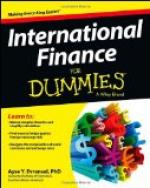Some people tell us that this commanding position of the English bill in the world’s markets is in danger of being lost owing to the present war: in the first place because America is gaining wealth rapidly, while we are shooting away our savings, and also because the Germans will make every endeavour to free themselves from dependence on English credit for the conduct of their trade. Certainly this danger is a real one, but it does not follow that we shall not be able to meet it and defeat it. If the war teaches us to work hard and consume little, so that when peace comes we shall have a great volume of goods to export, there is no reason why the bill on London should not retain much if not all of its old prestige and supremacy in the marts of the world. For we must always remember that finance is only the handmaid of industry. She is often a pert handmaid who steals her mistress’s clothes and tries to flaunt before the world as the mistress, and so she sometimes imposes on many people who ought to know better, who think that finance is an all-powerful influence. Finance is a mighty influence, but it is a mere piece of machinery which assists, quickens, and lives on production. The men who make and grow things, and carry them from the place where they are made and grown to the place where they are wanted, these are the men who furnish the raw material of finance, without which it would have to shut up its shop.
If they and their work ceased, we should all starve, and the financiers would have nothing behind the pieces of paper that they handle. If finance and the financiers were suddenly to cease, there would be a very awkward jar and jolt in our commercial machinery, but as long as the stuff and the means of carrying it were available, we should very soon patch up some other method for exchanging it between one nation and another and one citizen and another. The supremacy of the London bill of exchange was created only to a small extent by any supremacy in London’s financial machinery; it was based chiefly on the supremacy of England’s world-wide trade, and on our readiness to take goods from all nations. The consequence of this was that traders of all nations sold goods to us, and so had claims on us and drew bills on us, and bought goods from us, and so owed us money and wanted to buy bills drawn on us to pay their debts with. So everywhere the bill on London was known and familiar and welcome. If the Americans are able and willing to develop such a world-wide trade as ours, then the bill on New York will have a vogue all over the world just as is enjoyed by the bill on London. Then London and New York will have to fight the matter out by seeing which will provide the best and cheapest machinery for discounting the bill, that is, turning it into cash on arrival, so that the holder of it shall get the best possible price at the present moment, for a bill due two or three months hence.




